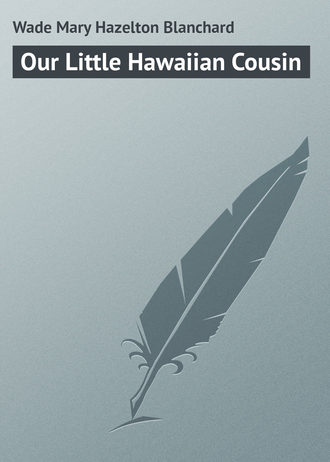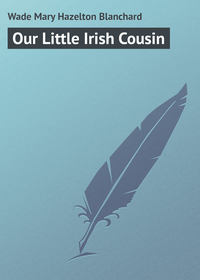 полная версия
полная версияOur Little Hawaiian Cousin
"Now I lay me down to sleep," repeats the gentle child, as she kneels in her little corner, and is soon fast asleep.
Where did Auwae learn this prayer? It was in the white church in the village. There the old Hawaiian minister tells his little flock every Sunday of the One True God, and of the loving Friend who said: "Suffer little children to come unto me, and forbid them not, for of such is the kingdom of heaven."
Auwae loves her Sunday school; she delights in the music of the organ and the songs she learns there. Every three months there is a grand celebration in the church. It is called "Quarterly Review." All the children in the country for miles around come flocking into Auwae's village. It is such a pretty sight, as the boys and girls come marching over the hillsides! The girls are dressed in white, and everybody wears a wreath and festoons of bright flowers. Sometimes they sing as they march along.
By ten o'clock in the morning the church is closely packed and the music begins. There is song after song, after which the children are called one by one to the platform to speak pieces and recite Bible verses. The ones who have learned most receive the prizes. Auwae won a prize at the last quarterly review. It is a picture of the infant Jesus giving water to his cousin John from a shell. No doubt you have seen a copy of it. Auwae thinks it is a lovely picture. It is the only one of any kind in her house.
The quarterly review lasts the whole day. The children do not get tired, however. They have a picnic dinner under the trees behind the church; then they are ready for more songs, and speak more pieces, until the round red sun in the west says:
"Come, my little ones, hurry homeward quickly. Many of you have miles of walking before you, and I cannot show you the way much longer."
Then Auwae bids her friends good-bye. She will not again see some of them till three months more have passed.
Aloha! Aloha! echoes back from the hill-tops, and our little girl turns again to her own lovely nest under the palm-trees. How different everything is now from the old days of Auwae's people! Her grandmother has told her about the hideous idols they used to worship.
There is an old heathen temple but a few miles from her home, and once, just once, Auwae and Upa dared to peep inside; then they ran away with all their might, for fear that somehow those long rows of ugly figures might become alive and follow them.
Think of it! less than a hundred years ago not only animals, but human beings, little children even, were sacrificed to hideous wooden and stone idols.
The people were in constant terror of the god of the shark, the goddess of the volcano, and other fearful beings who were ever ready, as they thought, to bring destruction upon them. Besides these, there were great giants and monsters whose anger must be satisfied by offerings of animals and men.
"How glad I am that I live now instead of a hundred years ago," says Auwae to Upa many times, as she thinks of Pele, the goddess of the volcano Kilauea. "Grandma has told me of her own mother, who really believed that Pele lived far down in the fiery crater, that she was the ruler and queen of fire. She thought that other spirits, too, lived there. There was the spirit of steam, the spirit of the thunderbolt, the spirit of strength, and I don't know how many other terrible beings. And oh, what times those spirits had together in the flames, dancing and making merry! But if the people forgot to bring Pele their offerings of hogs and bananas and all sorts of presents, she would get fearfully angry, and roar and threaten to overflow the country with lava. They would get very much frightened, and hasten to the summit of the volcano with the best they had."
And then perhaps Upa answers, "Please don't speak of those awful days any more. I like best to think of the time when our people turned from such ideas of their own accord, saying they were just nonsense. But, really, it must have taken a brave woman to do what Queen Kapiolani did. You know she walked right up the side of the mountain with her trembling followers, and kept on till she reached the very mouth of the crater, and then dared Pele to do her worst. She turned to her followers, and said: 'I do not believe in Pele! If there is no such being, no harm will come.' Of course, the people expected the fiery waves to leap up and swallow them, but nothing did happen, you know.
"Hurrah for the old queen's pluck, I say. After that, women dared to eat bananas and do many other things the priests had forbidden to all but men, saying it would make the gods angry. How silly the people used to be in those days!"
Then both children are still for a moment as they think lovingly of the good missionaries who came to their land just as their own people had given up idols. The good men and women came to tell them something better than they had ever known, – something to drive fear from their hearts, to destroy the cruel power of the priests, and to bring freedom of mind and body. What was it? The love of God!
CHAPTER V.
AUWAE'S SCHOOL
On the morning after the picnic the little brown maiden is awake bright and early. After her breakfast of poi and yams she weaves a wreath of fresh flowers for her head, and, taking her books under her arm, begins her walk to the village school. Her way leads past Upa's home, and the boy is already waiting for her. As she comes near he shouts:
"Oh, Auwae, I have something to show you. You've got time to stop a few minutes without being late to school. Come with me."
And the boy leads the way down a path to a tree covered with vines trailing from the topmost branches to the ground. It makes a perfect bower of the sweet-smelling blossoms; but it is not this Upa wishes to show. He leads Auwae close to the trunk of the tree and bids her look straight upward to an odd nest gnawed in the trunk far above them. From the hole two bright eyes are peering down at the children. They belong to a large rat that has made his home in the tree; perhaps he did this to be sure of safety from small boys. Or possibly it was to secure himself from the raids of the mongoose, so common in Hawaii nowadays.
"Poor little fellow," says Auwae, "I don't blame him. Father says that a good many rats live in the trees near here, but I never saw them there before. And father says, too, that the white men brought the mongoose here from India to drive out the rats, but the little fellows are not satisfied with killing them off; they want our chickens, too. It's a perfect shame. I wish they had stayed in their own country."
As the children now hurry on their way, they areobliged to cross a little stream where two women are washing. There are neither tubs, scrubbing-boards, nor soap to be seen. The clothing is dipped into the soft water and the parts most soiled are rubbed on flat stones. It must be rather hard on garments made of fine cloth, and it seems as though the women would get tired bending down. After all, there are but few things to wash, and, as the people do not work hard, their clothing cannot get badly soiled.
But look! Here come some of Auwae's schoolmates to join them. They are swimming down the stream. Each carries her clothing in a small bundle in her hand; she holds it out of the water as she paddles along. It is such a common matter that Auwae is not in the least surprised.
The schoolhouse is soon reached. It has but one large room, as there are but thirty children in the village. Much of the time the gentle schoolmaster sits with his pupils under the large tree near by. Auwae likes that much the best. She can never get used to the close air inside the house. But to-day the children must do some writing, so they sit at their desks and compose letters to their adopted brothers and sisters in America.
How odd it seems to see the schoolmaster tend his baby while he teaches the children! Why didn't he leave it with his wife at home? Because in this island of flowers it is the duty of men as well as women to act as nurses. It seems a strange idea to us, but, if they are satisfied, it must be all right.
Look at the baby! He is wrapped in enough clothing for six such tiny beings, and drops of perspiration are running down his face; but he does not cry.
"Aloha!" says our little Auwae, as she bows before her teacher. And "Aloha!" he replies, in a kind sweet voice. How many things this one word means! It answers for "good morning," "good-bye," "love," "thanks," and I don't know what else. But the smile that goes with it seems always to explain its meaning and make it the most delightful of words.
In Auwae's land the language was never written until the white people came to teach and help the Hawaiians. But it is very easy to understand, and Auwae could read when she had been at school only a few weeks. She had only twelve letters to learn. Every word and syllable of the Hawaiian language ends in vowels, and there are no hard sounds to pronounce. The sentences flow like music; so it is no wonder that Auwae composes poems so easily. They are very pretty, however, and her teacher is proud of her.
Auwae can tell you a great deal of the history of her island home. There are some parts of it that she loves to hear over and over again. On many a warm night as she lies on the grass with her head in her father's lap, she will look up into his kind eyes, and say:
"Papa, do tell me again about the very first Hawaiians. How did people come to live here after the island had grown up out of the sea? I can seem to see the seeds and twigs floating on to the shores with the tide. I can see the seeds sprouting and shooting up into tall trees out of the lava soil. But I wish you would describe again the boats loaded with people coming here from far away."
Then Auwae's father tells her of the time when there were no grass houses, nor brown children playing about them. He relates the stories handed down for hundreds of years about people living on distant islands across the equator. They were not treated kindly in their own land, and wished to find a new home where they could be happy and free. They were much like the Pilgrims who left Europe, and were willing to bear hardship and danger in New England.
CHAPTER VI.
LONG AGO
The old Hawaiians, who in those far-away times called themselves Savaiians, loaded their boats with provisions and other needed supplies. They set sail with their wives and children in hope of soon finding a pleasant home in some new island. Their voyage was longer, however, than they expected. Storms arose, and many of the poor little children grew sick and died. But the boats, which were hardly more than large canoes lashed together, rode safely onward. After many days the people saw the shores of the Hawaiian Islands ahead of them.
How glad they were to stand on dry land once more! They found a sheltered valley where they soon made themselves comfortable. They had brought with them some chickens, two or three pigs and dogs, besides the seeds of the breadfruit, and the kou trees. They found the taro plant already growing there. They had made poi from it in their old home, so they knew how to use it. Besides this, they found the kapa-tree. From its bark they could make new garments to take the place of their sea-worn clothing.
They were very happy. Children were born in this new and beautiful land. Seeds were planted; more pigs and chickens were raised. It was the Golden Age of Hawaii, for there were peace and plenty.
Even the Brownies helped the settlers, and often worked wonders in the land. At least, this is what Auwae's father said, and I think he believed in these queer little beings.
When he mentioned the Brownies, – Menehunes he called them, – Auwae's eyes grew large with delight. She loved to hear about this race of dwarfs who were said to have built immense fish-ponds and sea-wells. Why, if you yourself, should doubt there were such beings, Auwae could point to their large stone ruins not far from her home. She would say:
"Do you suppose any living people could set such great stones in place? Surely not! The Brownies are the only ones having strength enough to do work like that. Why, they are able to pass big stones from one to another for miles."
Her father tells her that the secret of the Brownies' power is that they work together and work till their work is done. When human people sleep they are busy, but if mortals walk abroad at such times the Brownies make themselves invisible. Those were certainly wonderful times when the spirits of the earth worked for men, and did such mighty deeds in Hawaii.
But an end soon came to this joy and comfort, for men began to quarrel and have wars against each other. Then the Brownies withdrew their aid, and left them to themselves. Sickness fell upon the Hawaiians. There were many rulers, each one trying to gain all the power possible. The rich grew richer, and the poor poorer. Wicked priests, as well as the chiefs and masters, held the people in fear. It was a sad, sad time. The "chiefesses" (for there were women rulers) were no better than the men.
At last a child was born in Hawaii, who was unusually strong and wise. He grew up and became a great chief. His name was Kamehameha. That word means "The Lonely One." He was very ambitious. He looked over the island of Hawaii, and said to himself:
"I will make myself king of this whole land. I will bring the people more closely together. I will change many of the customs which are bad and harmful."
He kept his word. He rallied his own men around him, and was soon ruler of the entire island. But still he was not satisfied. He looked across the sea to other islands, and said:
"I will be ruler over all these, too. My kingdom shall be a powerful one."
He sailed with his troops in his strong war-canoes, and soon landed on the island of Maui, not far from Hawaii.
The king of that island had been warned of the coming of the enemy. He was already marching down a narrow pass between the mountains to meet The Lonely One and his army.
Kamehameha did not waste a moment. He rushed up the pass, his men following him in single file, and there, in a narrow pathway at least a thousand feet above a deep abyss, the two armies met. As each one of the Hawaiian soldiers stepped upward, he met and grappled with one of the enemy. One or the other was sure to be hurled downward over the precipice, and meet death below, if he were not already killed on the narrow pathway.
It was a terrible battle. When night came the army of Maui was no more, and Kamehameha was ruler of that island.
He was suddenly called back to his own home, for news came that a rebel leader in Hawaii had risen against him. This leader encamped with his men near the volcano Kilauea. As the great Kamehameha advanced to meet them an earthquake shook the land; a violent storm of cinders and sand rose out of the crater to a great height, and then fell down over the mountainside.
When the men were able to advance once more it was found that a large part of the rebel army had been killed by the eruption. At this the people exclaimed:
"Surely the Goddess Pele was angry at the rebel chief. She chose this way to show her favour toward Kamehameha."
After this there were other troubles, but The Lonely One grew more and more powerful. At last he became the ruler of all the islands. He did with them as he had promised himself, and the people were united and happy as long as he lived.
CHAPTER VII.
THE COMING OF THE WHITE MEN
At nearly the same time that this brown king was born in Hawaii, a baby was born in far-distant England, who was, many years after, the first white person to visit Auwae's home. This baby's name was James Cook. He was a little country boy. His father was very poor. James might not even have had a chance to learn his letters if it had not been for the kindness of a good woman who lived in his village.
The boy had to work hard, even when very small. He did not like his work, either, and after awhile he said:
"Oh, how I long to leave this place and be free! I would rather live on the beautiful blue ocean than here in the country. I shouldn't mind doing the hardest things on board a ship."
After awhile he made up his mind that he could not bear it any longer. One dark night he packed up a small bundle of clothing and ran away to sea.
Do you imagine he found a kind captain waiting at some dock who became his good friend and helper? Don't imagine it for a moment. He did find a captain, and a ship, too. He also got a chance to work as a cabin-boy, but he was badly treated, and had to work far harder than he ever did on land.
Yet he loved the life of the ocean so much that he kept on sailing, and worked his way up to a high position. He even became a captain. People now called him "Captain Cook," and he was sent on long and dangerous voyages in the English navy. When he was at home in England he was invited to great dinners, and given high honours, for he had become a famous man.
At last he was asked to make a more dangerous voyage than he had ever yet tried. Wise men thought there might be a short way for ships to sail from Europe to Asia by going north of America. There were many icebergs, to be sure, as well as seas all frozen over, but perhaps there was a warm current running through the ocean. Captain Cook was so wise and brave he was the very man to try to find the Northwest Passage, as it was called.
He started out with a goodly fleet. He sailed for many weeks. Many strange things happened. You must read the whole story of the voyage some time. But the brave captain did not find the Northwest Passage; he did, however, discover the islands of Auwae's people.
One morning at sunrise, as he came sailing into one of the harbours, the brown natives flocked to the shore. They had never seen a ship before. They wondered what it could be. Was it a forest that had slid down into the sea? Or was it the temple of Lono with ladders reaching up to the altars?
It seems that Lono was one of the gods in whom the brown people still believed. He had gone away from their island long before, and had promised to come back some day on an island bearing cocoanut-trees, swine, and dogs.
They thought the tall masts must be the cocoanut-trees, and when they saw the dogs and swine on board the ships, they were quite sure the promise had come true. Captain Cook himself must be Lono come again, and the sailors were lower gods who served him.
One of the priests brought a red cloak and placed it on Captain Cook's shoulders. This was the mark of his greatness. Such an honour could only be offered a god.
There were great feasts for the visitors. Offerings of fruit, chickens, and all good things possible were made to the white men. They grew fat on the fine living. They were merry over their good times. No doubt they laughed at the foolish belief of the savages, as they called them. But they did not say:
"My brown friends, we are glad you are so kind to us, but please don't think we are great beings. We are human beings like yourselves."
Do you not think that would have been wiser and more honest?
After awhile one of the sailors died. Then the brown people began to think. They said among themselves:
"Gods cannot die. These people die, so they cannot be gods."
They began to watch more closely. Captain Cook was very quick-tempered. He and his men sometimes quarrelled with the natives and were cruel. At last, sad to say, the brave captain was killed in one of these quarrels.
Some people believe the Hawaiians of that time were cannibals and ate his dead body. But this is not true. Auwae would feel very badly if she thought her American brothers and sisters could believe this. Captain Cook was a very great and brave man in the opinion of the brown child, as well as in yours. But he ought not to have let the people believe he was anything else than himself, – a white traveller from other lands.
There is a monument to his memory on the island, and when you visit Auwae she will take you to see it.
After Captain Cook's death other white men came and taught the Hawaiians many things. They helped the rulers in governing wisely; and at last the people saw it was best to put themselves under the care of their white brothers.
Auwae likes to read about the old days, however. She delights in hearing her grandmother tell of her own youth; of the visit the king once made to her village; and of the grand celebration in his honour. The days were given up to feasting and entertainments. Men practised boxing and wrestling for a long time beforehand; there were wonderful feats on horseback, in which Auwae's grandfather took part.
As he rode at full gallop through the village, he surpassed all others in leaning from his horse and picking small coins from the ground. Best of all, the old woman said, as he rode along he wrung off the necks of fowls whose bodies were buried in the ground. And this he did without checking his horse's pace at all.
But the most joyful part of the day was when the king, fairly covered with wreaths of flowers, took his place under a beautiful pandanus-tree; then his subjects, one by one, came up before him, and, cheering and bowing, gave him offerings. It was always the best which the people offered their lord. There were presents of live fowls, hogs, clusters of bananas, cakes of seaweed, eggs, cocoanuts, nets of sweet potatoes, taro; everything which the king could desire.
"What joy and good-will those days brought!" says Auwae's grandmother. "It was the happiest time of my life."
The old woman takes a great deal of interest in everything her little granddaughter does. She is very proud of Auwae's collection of land-shells. She thinks it must be the finest one any child possesses in the whole island. She, herself, gave Auwae at least half of the different varieties. She had kept them from the time of her own childhood.
Did you ever hear of land-shells? They are found on the low, overhanging branches of trees, and the little creatures who make their homes in them would die if you were to put them into the salt water. They are very tiny, and are of many different tints. Auwae has beautiful blue ones, as well as rosy pink, pale yellow, green, violet, and I don't know how many other colours. In little basket trays, side by side, they look very pretty. Each variety has a tray of its own.
Many days must have been spent in gathering the collection; many different people have helped Auwae in making it, – for often only a single kind of shell can be found in one whole island. People in Hawaii exchange specimens, just as the American boys and girls trade postage-stamps with each other. The white people in the village would like to buy Auwae's collection to send to a museum across the ocean, but she would not think of parting with it.
CHAPTER VIII.
THE DIVER
When school is over, Upa and Auwae go home through the woods so that they can throw stones in a certain waterfall. They have no fear that snakes will suddenly take them by surprise, for there is not a single one in the whole island. Neither do they hear frogs croaking beside a shady pool, for neither frogs nor toads have ever hopped upon Hawaiian soil.
Wherever they come to an open space beneath the trees, they play ball. Upa made his own ball out of leaves which he packed closely together, and Auwae bound it with sweet-smelling grasses when he had pressed it into shape.
The boy's busy mind has planned new sport for the afternoon, and he says:
"Auwae, after you have had your nap, do you want to fish? Old Hiko is going out to the coral reefs, and he has promised I should go with him. He says I may bring you, too, if you wish."
Auwae claps her hands with pleasure, for it will be a great treat. Hiko is the only one in the village now who dives for fish. The other men use lines made from the fibres of the flax-plant, and are satisfied to sit in their boats, and lazily wait for bites. Auwae has grown to be a fine diver, and hopes to learn something by watching the old man.
After a dinner of dried devil-fish and sweet potatoes, with baked seaweed for a relish, and a delicious pudding of grated taro and cocoanut milk, our little brown cousin stretches herself under the trees, and is soon fast asleep.
She is dreaming of catching fresh-water shrimps in the stream near her house when she is roused by a gentle pat on her forehead. It is Upa, who says:









